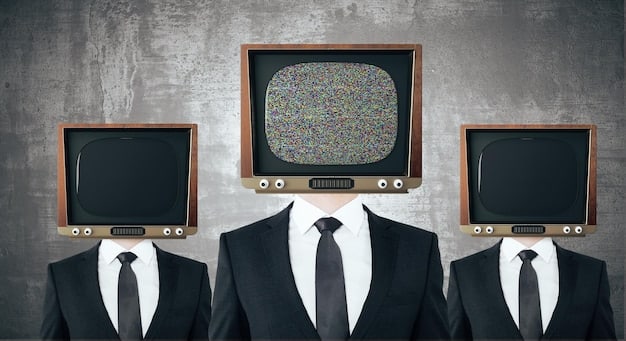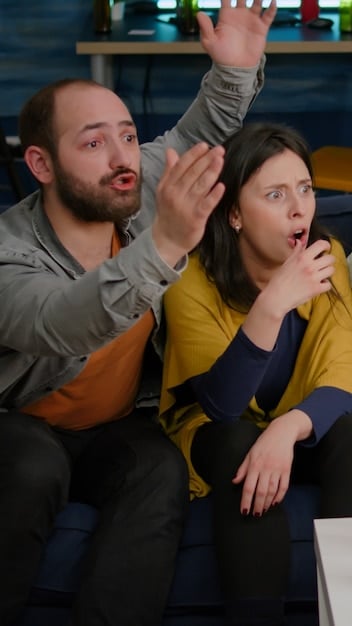Reality TV Scandals: The Biggest Controversies of the Last 3 Months

The biggest reality TV scandals of the last three months involve controversies ranging from on-set altercations and accusations of unfair treatment to social media backlashes and allegations of scripted drama, impacting the reputations of shows and participants alike.
Reality television, known for its unfiltered drama and larger-than-life personalities, often finds itself at the center of controversy. In the past three months, the world of reality TV has been rife with scandals that have captured headlines and sparked intense debate. From shocking on-screen altercations to allegations of manipulation behind the scenes, reality TV scandals: The biggest controversies of the last 3 months have kept viewers and critics alike on their toes.
On-Set Altercations and Physical Confrontations
One of the most recurring types of reality TV scandal involves on-set altercations that escalate into physical confrontations. These moments often blur the line between genuine emotion and manufactured drama, leaving audiences and producers scrambling to manage the fallout.
“Love Island” Contestants Clash
Recent episodes of “Love Island” have been marred by several heated arguments among contestants, leading to accusations of bullying and aggressive behavior. The most notable incident involved two male contestants who nearly came to blows during a challenge, resulting in intervention from the production crew and subsequent warnings about acceptable conduct.
“The Real Housewives” Drama Turns Physical
“The Real Housewives” franchise, notorious for its dramatic confrontations, saw one of its most explosive incidents in recent months. During a cast trip, a dispute between two housewives escalated into a physical altercation, resulting in one cast member being injured and the other facing potential legal repercussions and immediate suspension from the show.
- Production Intervention: The role of producers in managing and sometimes instigating conflicts.
- Cast Member Safety: Measures taken to ensure the physical and emotional safety of participants.
- Ethical Considerations: The ethics of airing violent content for entertainment purposes.
- Legal Ramifications: The potential legal issues arising from on-set altercations.

The aftermath of these altercations raises serious questions about the responsibilities of production companies. While drama is often seen as integral to the success of these shows, the well-being of the cast members must take precedence to ensure safety and prevent long-term impacts on their mental health and reputation.
Accusations of Unfair Treatment and Bias
Another significant source of controversy in the reality TV world stems from accusations of unfair treatment and bias against certain contestants. These allegations can range from biased editing to preferential treatment, leading to accusations that the show is rigged or manipulating storylines.
“The Bachelor” Faces Scrutiny
“The Bachelor” has faced increasing scrutiny over allegations of biased editing that portray certain contestants in a negative light. Several former contestants have spoken out about scenes being manipulated to create drama or alter their true personalities.
“Dancing with the Stars” Judges’ Favoritism
Judges’ favoritism on “Dancing with the Stars” has long been a topic of contention, but recent episodes have intensified these concerns. Viewers have accused specific judges of consistently scoring certain contestants higher than others, regardless of performance quality.
- Editing Manipulation: How editing choices can alter perceptions of contestants.
- Production Influence: The role of producers in shaping narratives and outcomes.
- Fan Backlash: The impact of perceived bias on viewership and social media engagement.
- Contestant Experiences: Personal accounts from contestants about unfair treatment.
These allegations underscore the importance of transparency and fairness in reality TV production. While some level of manipulation is expected for entertainment value, blatant bias can undermine the show’s integrity and alienate viewers who feel the competition is not genuine.
Social Media Backlashes and Public Outcry
In the age of social media, reality TV stars are constantly under the microscope, and their actions both on and off-screen can quickly trigger massive public outcries. Social media backlashes have become a common consequence of controversial behavior, turning public opinion against contestants and even entire shows.
Racist Remarks on “Big Brother”
Several contestants on the latest season of “Big Brother” faced severe backlash after making racist remarks that were caught on live feeds. The comments sparked outrage online, leading to calls for the contestants to be removed from the show and face public accountability.
Offensive Behavior on “Survivor”
A contestant on “Survivor” was called out for offensive and insensitive behavior towards other players, resulting in widespread condemnation on social media and calls for the show to address the issue. The controversy highlighted the need for better vetting and sensitivity training for reality TV participants.
- Social Media Storms: How social media amplifies and accelerates controversies.
- Public Shaming: The impact of public shaming on contestants’ reputations.
- Corporate Responsibility: The responsibility of networks and production companies to address offensive behavior.
- Long-Term Consequences: The long-term impact of social media scandals on contestants’ careers.

The speed and intensity of social media backlashes present unique challenges for reality TV productions. Shows must be prepared to respond quickly and decisively to controversies in order to mitigate damage to their brand and maintain viewer trust. This includes implementing stricter codes of conduct and providing support for contestants facing public criticism.
Scripted Drama and Authenticity Concerns
One of the most persistent criticisms of reality TV is the extent to which the drama is scripted or manipulated by producers. Concerns about authenticity can undermine the appeal of these shows, as viewers seek genuine and unscripted interactions.
Leaked Memos from “Keeping Up with the Kardashians”
Leaked memos from “Keeping Up with the Kardashians” revealed detailed outlines for storylines and dialogue, raising questions about the show’s authenticity. The revelations fueled longstanding suspicions that much of the drama is carefully crafted for entertainment purposes.
“Pawn Stars” Staged Encounters
Former participants on “Pawn Stars” have alleged that many of the encounters with customers are staged, with producers setting up specific scenarios to create more compelling television. These claims erode the perception of the show as an authentic representation of a pawn shop’s daily operations.
- Producer Influence: The extent to which producers guide storylines and interactions.
- Contestant Agreements: The legal agreements that allow for manipulation of events.
- Viewer Perception: How concerns about authenticity affect viewer engagement.
- Ethical Boundaries: The ethical boundaries of manipulating reality for entertainment.
Maintaining a balance between entertainment and authenticity is crucial for the long-term viability of reality TV. Shows that are perceived as overly scripted risk losing their appeal to viewers who crave genuine experiences and unscripted drama.
Financial Mismanagement and Fraudulent Activities
Beyond on-screen drama, some reality TV scandals involve financial mismanagement and fraudulent activities that tarnish the reputations of both the shows and the individuals involved. These scandals can range from tax evasion to embezzlement, and they often result in legal consequences and public condemnation.
“Real Housewives” Star Indicted for Fraud
A star of “The Real Housewives” franchise was indicted on charges of fraud and money laundering, alleging that she had been involved in a scheme to defraud investors. The charges shook the reality TV world and raised questions about the vetting processes for cast members.
“Dance Moms” Instructor’s Tax Evasion
The instructor from “Dance Moms” faced legal trouble for tax evasion, stemming from unreported income earned from the show and related activities. The scandal damaged her reputation and led to a prison sentence.
- Financial Oversight: The need for better financial oversight in reality TV productions.
- Background Checks: The importance of thorough background checks for cast members.
- Legal Ramifications: The legal consequences of financial crimes committed by reality TV personalities.
- Public Perception: How financial scandals affect the public’s view of reality TV.
These financial scandals highlight the need for greater scrutiny and accountability within the reality TV industry. Networks and production companies must ensure that cast members are held to high ethical standards and that financial practices are transparent and legitimate.
Mental Health Concerns and Exploitation
The intense pressures and public scrutiny associated with reality TV can take a toll on the mental health of participants. Concerns about exploitation have led to calls for better support and protections for contestants both during and after their time on the shows.
“The Biggest Loser” Weight Loss Pressures
Former contestants on “The Biggest Loser” have spoken out about the extreme weight loss pressures and the long-term health consequences they experienced as a result of the show’s methods. The revelations raised concerns about the ethical implications of promoting rapid weight loss for entertainment purposes.
“16 and Pregnant” Long-Term Effects
Participants on “16 and Pregnant” have shared their experiences about the challenges of being thrust into the public eye while dealing with the responsibilities of motherhood. The mental and emotional toll of the sudden fame and scrutiny has been a significant concern.
- Mental Health Support: The need for adequate mental health support for reality TV contestants.
- Ethical Considerations: The ethical considerations of putting vulnerable individuals in the spotlight.
- Post-Show Support: The importance of providing support for contestants after their time on the show.
- Industry Responsibility: The responsibility of the industry to protect the well-being of participants.
Addressing mental health concerns and preventing exploitation is essential for the future of reality TV. Networks and production companies must prioritize the well-being of their participants and provide comprehensive support systems to mitigate the risks associated with fame and public scrutiny.
| Key Point | Brief Description |
|---|---|
| 💥 On-Set Altercations | Physical confrontations and heated arguments among contestants. |
| ⚖️ Unfair Treatment | Accusations of biased editing and judges’ favoritism. |
| 📱 Social Media Backlash | Public outcry over racist remarks and offensive behavior. |
| 💸 Financial Misconduct | Fraudulent activities and tax evasion by reality stars. |
Frequently Asked Questions
Common scandals include on-set altercations, accusations of unfair treatment, social media backlashes, and concerns about scripted drama. These issues often lead to public outcry and damage the reputations of the shows and participants.
Production companies typically intervene to ensure the safety of cast members. They may issue warnings, suspend participants, or implement stricter codes of conduct to manage and prevent physical confrontations.
Social media amplifies controversies, leading to rapid public shaming and calls for accountability. Networks must respond quickly to these backlashes to mitigate damage to their brand and maintain viewer trust.
While marketed as reality, many shows involve some level of scripting or manipulation by producers. Concerns about authenticity can affect viewer engagement, as audiences seek genuine interactions.
Networks and production companies are increasingly providing mental health support and post-show counseling to help contestants cope with the pressures of fame and public scrutiny. This includes better vetting and sensitivity training.
Conclusion
The reality TV landscape is constantly evolving, and with it, the nature of its scandals. From the ethical implications of on-screen altercations to the pervasive influence of social media, these controversies underscore the need for greater responsibility and transparency within the industry. By addressing these issues, reality TV can strive to strike a better balance between entertainment and ethical conduct.